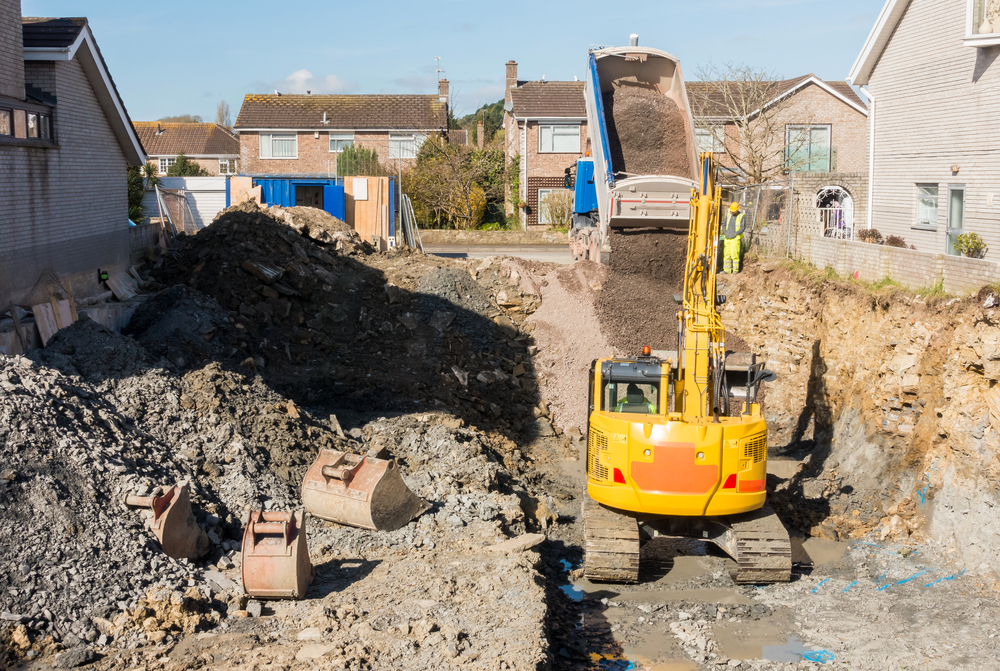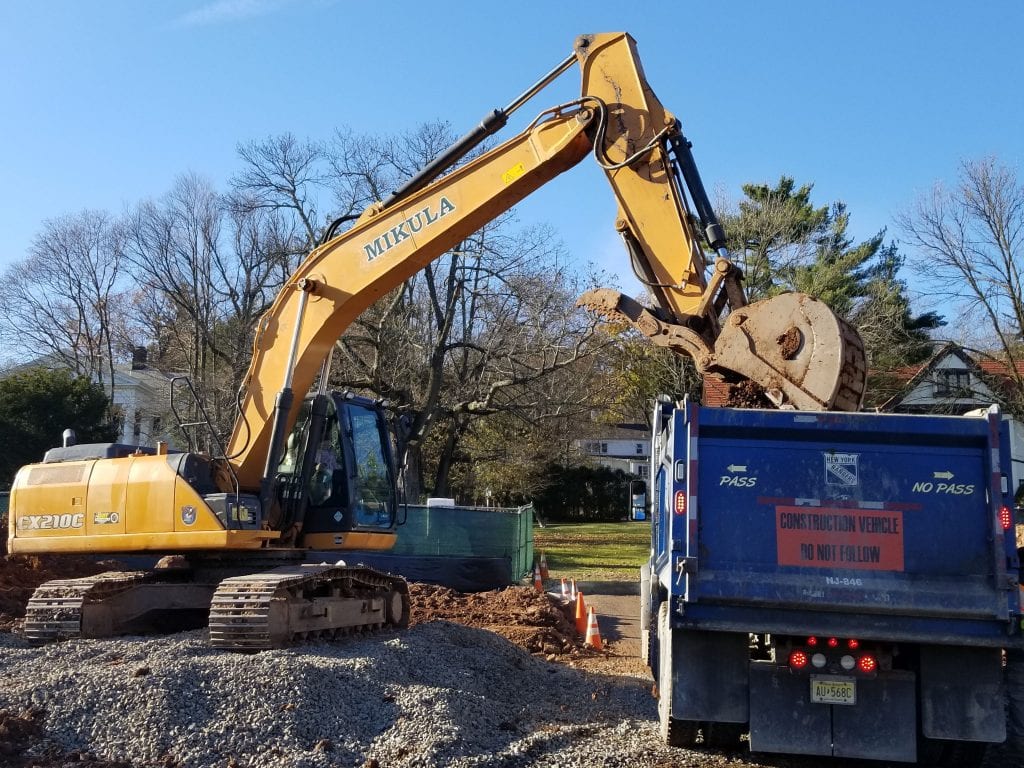The Of Excavator
Wiki Article
The Main Principles Of Excavation Contractors Near Me
Table of ContentsGrading Contractors Things To Know Before You BuyAll about TrencherConcrete Contractors Things To Know Before You Get ThisThe Ultimate Guide To Excavation CompaniesSome Of Excavator


Scrapers or Pans excavate soil in one place, haul and also unload the dirt in one more place (general contractor). It is challenging to match the efficiency of scrapes for cut/fill soil operation if the haul distance is less then a mile. Scrapers are typically pulled by a rubber tire wheel tractor as well as are occasionally pressed through the cut location by a bulldozer.
There are lot of times that scrapes are not made use of for website grading and also a dump truck is used: the haul may be to long, the haul might go across roads where scrapers are not allowed, tough rock might be run into, devices accessibility, and so on. Unload trucks are in common use and also possibly need little conversation.
Many trucks have a top-hinged tailgate that can not dump any type of rock bigger then the tailgate width. "Rock body" beds, on the other hand, have no tailgates as well as can dump any type of dimension rock, although their volume capability is decreased. These web links show devices requirements for numerous common dump vehicles. Compaction Equipment enhances the density of the dirt as well as in many cases gives a smooth, rolled surface area.
Some Known Details About Demolition
From a straightforward test pit to percussion drilling to core boring the owner has progressively a lot more costly choices that produce significantly much better data concerning the website underground. The Proprietor on a 100,000 SF building task might license twenty dull places with split spoon soil samples taken till rock is reached as well as then core examples of rock.Knowing the type and also top quality of rock (from the core examples) and location of rock (from the soils boring) is a real benefit in jobsite planning. Alternatively, the Owner of a 100,000 SF building might make a decision to wage no geotechnical screening whatsoever. The decision about geotechnical screening is generally made by an Owner with no input from the Construction Manager.
A knowledge of the approximate area of the rock helps the Construction Manager to intend the series of steps complying with rock excavation. If rock is in one corner of a huge building project, for example, the earth excavation can begin at the contrary end of the structure in order to begin foundation job soonest.
Starting the structure job early would be a great idea if the rock might be gotten rid of by ripping. Nonetheless, if the rock is very tough and needs substantial blasting, it might be sensible to hold foundation work up until the blasting is finished. The Building Supervisor must work with these kinds of decisions and use all the technological day readily available.
Facts About Grading Contractors Revealed
Unidentified excavation stipulates that all rock or various other unforeseen products (omitting harmful materials) experienced in the sitework will certainly be the duty of the Specialist at no modification in agreement cost. An unidentified excavation is easier from a book-keeping standpoint as well as positions the obligation for geotechnical problems onto the Sitework Service provider.Exactly How Water Impacts Sitework? It's impressive what a heavy grading and excavating contractor rainfall can do to a building project. Prior to the rain, the site may be completely dry, hefty equipment efficiently moving planet, the various other professions smoothly doing their job. Within hrs the task can be a careless, mud-hole with worker performance cut to about 10%.
In many locations of the globe, the Construction Manager have to bear in mind a straightforward reality: IT WILL RAIN. Excellent preparation can decrease the damages and also disruption of a heavy rain to a jobsite. Usually the excavation as well as grading is entrusted to the Sitework Specialist (and also their Foremen is liable to oversee and also route the hefty devices and also drivers).
As A Result the Construction Manager need to be continuously familiar with what rainfall will certainly do to the job website. It is not unusual for the Sitework Supervisor to function their heavy equipment for optimal performance as well as hope it doesn't rain. One of the ideal methods to plan for rainfall is to incline all grades to drain as well as to smooth rolled the surface before a rain.
The Ultimate Guide To Excavator
The Building Manager must be discerning enough to insure that heavy rainfall does not quit working on the project much longer than necessary. Daily discussions with Sitework Foremen might be needed to accomplish this goal. At any time excavation is needed below the existing aquifer on a job, the procedure of dewatering need to be considered.In a genuinely cohesive soil, the water takes a trip so slowly via the clay or silt that dewatering is not typically essential for the reasonably brief time of excavation. Dewatering might be needed for a solitary footing excavation or for an entire project website. The most typical dewatering methods are trench drains pipes, deep wells and also well points.

Ground water infiltration can likewise be lowered by cutoff approaches such as sheet loading. High dewatering prices have paled the profit margins on far as well many jobs.
This choice needs to constantly be thought about when analyzing the prospect of dewatering. Obviously the choice is just viable if gravity can run the water to reduced ground. Trench drains pipes can be cut with a backhoe as well as loaded with a coarse, granular material (# 4 rock as an example), but treatment has to be worked out excavation calculator in selecting the water electrical outlet kind as well as location.
The Ultimate Guide To Mini Excavator
A siphon, by interpretation, uses air pressure to lug water from one elevation, up over a barrier, to a reduced altitude. The pipes in a siphon system must be closed as well as some resourcefulness is frequently required to totally fill the siphon pipe. The siphon pipeline should be full for the siphon to begin.A deep well includes a pump, pipe as well as a vertical well casing. The pump intake is at the base of the well covering (normally some crushed rock is put down there as a filter medium) (excavating contractors). The water is pumped up the hose, out of the well housing, as well as to an ideal discharge location.
In a crude sand, as an example, a huge location can visit their website be pumped to near the pump consumption altitude. A less permeable dirt, on the various other hand, lowers the effectiveness of a deep well. Given that the pump is normally at the end of the deep well, there are no height limitations because of vacuum lift, and deep wells can reduce the groundwater over 50 feet.
On the bottom of the wellpoint there is a 2 foot long screen and also shutoff, water jets out of this valve and creates an opening into which the wellpoint pipe can be reduced. This hole is typically made a bigger size (as an example 10 inches) to enable a crude sand backfill to help filter the water (grading contractors).
Report this wiki page